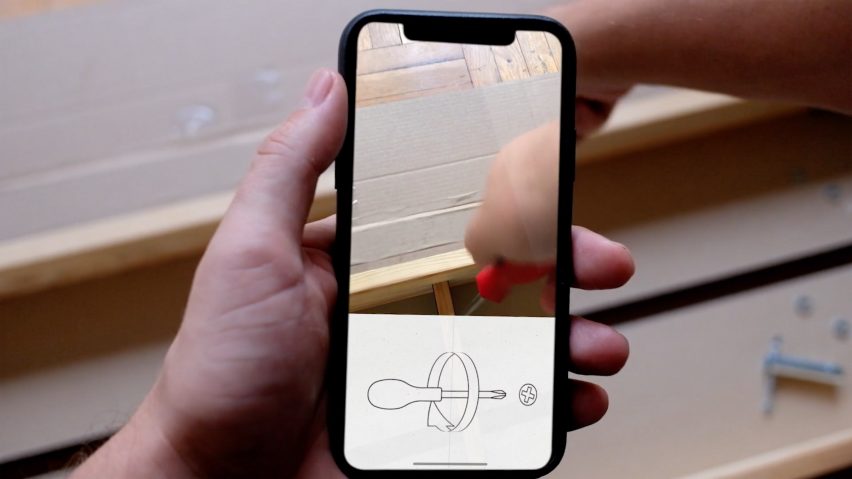
IKEA assembly made easier through augmented-reality app
Toronto designer Adam Pickard has turned paper IKEA manuals into an augmented reality app that shows users life-size instructions on how to build their furniture.
Pickard's AssembleAR app was designed using a combination of 3D modelling and post-production editing.

After the IKEA Place app was released last year, which allowed users to preview products in a home setting, Pickard wanted to develop a similar programme that could make the sometimes painstaking process of putting together flat-pack furniture easier.
"It made me think about how this technology could be used for more complex tasks, the IKEA assembly manual seemed the right place to start," Pickard said.
"Even though it's well designed, people often struggle with the self-assembly – it can even be so bad that there are professionals who can be hired to do it for you," he continued.
To use the app, users firstly scan the barcode on their furniture item. This then brings up an animated version of the manual associated with that piece, along with an AR version of the box on the floor.

They are then instructed to swipe across the screen to open the box and then continue swiping to make their way through the different steps.
Although AssembleAR focuses on IKEA products, it isn't an official app from the company – Pickard simply wanted to "experiment with the potential of this type of technology, rather than presenting a finished user experience."
However, the designer was keen to retain a similar aesthetic to the existing manuals, while making them more interactive and easier to understand through animations.

He began by looking at the different steps highlighted in the manuals, and how each linked together. He then modelled the furniture parts and tools in Cinema 4D software – with each designed to have a render-style look similar to the IKEA original.
Pickard then questioned how the user would interact with the app, and how information should be presented to them.
He created a small section at the bottom of the screen that would detail specific parts of each step, such as bolts or screws they would need. All of this was achieved through the use of Adobe's Illustrator, Photoshop and Premier software.

Pickard isn't the first to re-hash IKEA's assembly manuals.
London studio Special Projects created a flat-pack survival guide to avoid the "screaming arguments" that come with assembling the company's furniture. The three Missing Pages manuals are designed in the style of Ikea's assembly booklets and offer extra instructions to resolve the frustrations often associated with assembling flat-pack furniture.
Last year, the company itself shared spoof instructions for turning its rugs into luxurious fur capes, following revelations that Game of Thrones costume designers used the brand's home accessories to dress their actors.
IKEA was founded in 1926 by Ingvar Kamprad, who died earlier this year aged 91. The Swedish furniture giant topped Dezeen Hot List in 2017, for its vast range of initiatives over the past year.
These include the introduction of snap-together furnishings, which do away with fiddly Allen keys, and a collection of no-waste products.